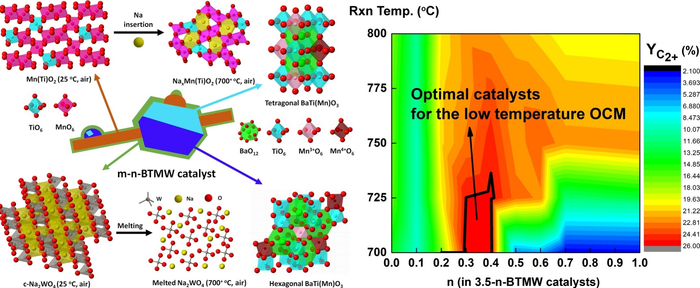The Korea Institute of Science and Technology's (KIST) President, Dr. Yoon, Seok-Jin, declared that a research group headed by Dr. Jeong-Myeong Ha of the Clean Energy Research Center came up with a process technology and catalyst for eliminating hydrogen sulfide, a poisonous substance, during the process of ethylene production from methane in biogas.
 Graphical abstract. Image Credit: Korea Institute of Science and Technology (KIST)
Graphical abstract. Image Credit: Korea Institute of Science and Technology (KIST)
Biogas, produced by microorganisms present in livestock manure, food waste and sewage sludge, consists of methane that can be utilized for affordable energy such as power generation, heating and town gas.
Methane can obtain a huge added value if transformed into ethylene, a basic raw material for industries, via chemical reactions. Ethylene is a normal non-petroleum product that has the ability to decrease greenhouse gases.
The research group came up with a process technology in 2021 that helps produce ethylene from biogas with catalysts. Besides methane, biogas seems to be highly beneficial and also consists of a considerable amount of toxic hydrogen sulfide. This is hard to eliminate and interferes with the catalytic reaction in ethylene production.
The developed technology streamlines ethylene production by oxidizing and eliminating hydrogen sulfide during the production process.
Furthermore, a catalyst was developed by the researchers to enhance the reaction activity of ethylene production from methane and biogas.
This catalyst was highly resistant to hydrogen sulfide, thus eliminating the need for hydrogen sulfide removal from biogas, while the energy usage could be reduced by decreasing the operating temperature from 800 °C to 700 °C as a result of enhanced reaction activity. Through such a reaction, it is possible to directly generate ethylene from biogas consisting of hydrogen sulfide.
Biogas is already produced in large quantities in Korea, and if biogas is used as a raw material for the chemical industry rather than just for heating, biogas producers who struggle to achieve carbon neutrality will have a larger market and be able to provide new raw materials without greenhouse gas emissions.
Dr. Jeong-Myeong Ha, Clean Energy Research Center, Korea Institute of Science and Technology
“This technology will draw attention from related companies as it can utilize not only biogas but also methane generated from various wastes such as plastics,” concludes Dr. Jeong-Myeong Ha.
Journal Reference:
Do, L, T., et al. (2021) Hybrid catalysts containing Ba, Ti, Mn, Na, and W for the low-temperature oxidative coupling of methane. Applied Catalysis B: Environmental. doi.org/10.1016/j.apcatb.2021.120553.